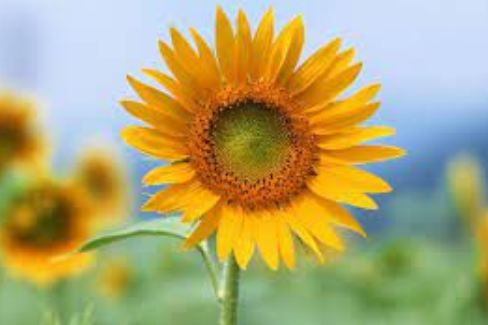QAZI SHOAIB KHAN
ATTOCK (NOV-21) The growers of Attock, Rawalpindi, Gujrat , Chakwal districts and other parts of the Punjab have been advised by the technical experts of the Agriculture Department to cultivate sunflower crops from February 1 to 25th of February starting its cultivation from January and complete it by mid of February to get a bumper yield. A spokesman for the agriculture department said on Tuesday that Pakistan spent Rs350 billion in import of edible oil per annum. “If oil-seed crops are promoted in the country, we can save the import budget but also could earn maximum foreign exchange”, he added.
He said sunflower was a precious oil-seed crop which could not only cater to domestic food
requirements but would also play an active role in trimming down import bill of edible oil.
Therefore, farmers should cultivate sunflower crops over maximum space of their lands and its production would also play a pivotal role in mitigating financial sufferings of growers
due to its high market value, he added.
He said time from January 1 to February 28 was most suitable for Baharia cultivation
of sunflower, therefore, growers should start sunflower cultivation from the advent of January
and complete it by end of February as late sowing could not only damage quality of the grain
but it also hampered production. He said growers of Bahawalpur, Rahim Yar Khan, Khanewal, Multan, Vehari and Bahawal Nagar districts should start sunflower cultivation from January 1 and complete it by January 31 whereas most suitable time for sunflower cultivation in Muzaffar Garh, Dera Ghazi Khan, Layyah, Lodhran, Rajan Pur and Bhakkar was from 10th of January to 10th of February.
Similarly, farmers of Faisalabad, Jhang, Mianwali, Sargodha, Khushab, Sahiwal and Okara should
cultivate sunflower crops from January 15 to February 15 while suitable time for sunflower
cultivation in Sialkot, Gujranwala, Lahore, Mandi Baha-ud-Din, Kasur, Sheikhupura, Nankana Sahib
and Narowal was from February 1 to February 28. The growers of Attock, Rawalpindi, Gujrat and Chakwal district should cultivate sunflower crops
from February 1 to 25th of February, he said.
The spokesman said growers should cultivate approved sunflower varieties like Hi-sun-33, Hi-sun-39, Agora-4, NK-278, FH-331, DK-4040, G-101 and 64-A-93 because these varieties are not only disease resistant but also give bumper yield, he added.
ATTOCK (NOV-21): The National Highways and Motorway Police (NHMP) on Tuesday issued travel advisory for prevailing hazardous condition posed a significant threat to motorists as the dense fog engulfed two sections of the Motorway North Zone, reducing visibility to a mere 30-50 meters that could lead to accidents.
The NHMP issued travel advisory for the commuters specially at night times on Motorway North Zone sections.
The affected areas are identified from Haji Shah (KM 1620) to Attock Khurd (KM 1627), where visibility is at a perilous 30-50 meters.
Further north, from Khairabad Bridge (KM 1628) to Nihal pura (KM 1635), visibility is slightly better but still dangerously low at 50-60 meters, the NHMP public relations officer told APP.
The Pakistan Meteorological Department issued a warning urging motorists to exercise extreme caution when traveling through these areas.
The drivers are advised to reduce their speed, use their fog lights, and maintain a safe distance from other vehicles.
In addition to the fog, two sections of the Motorway North Zone are also experiencing roadwork from Wali Interchange (KM 450) to Near Wali Interchange (KM 451), the North Bound 2nd Lane and 3rd Lane are closed from Near Swabi Interchange (KM 422) to Near Swabi Interchange (KM 422.400), the South Bound 1st Lane and 2nd Lane are also closed.
The motorists traveling through these areas are advised to be aware of the road closures and plan their routes accordingly.

















